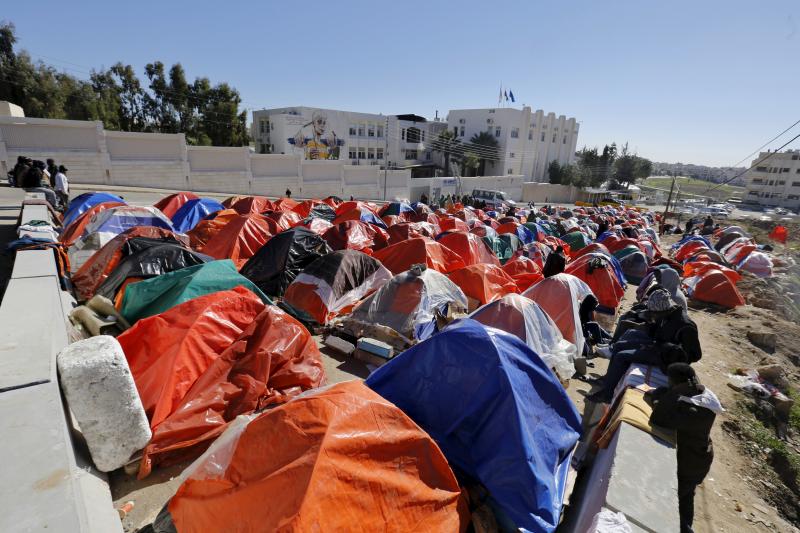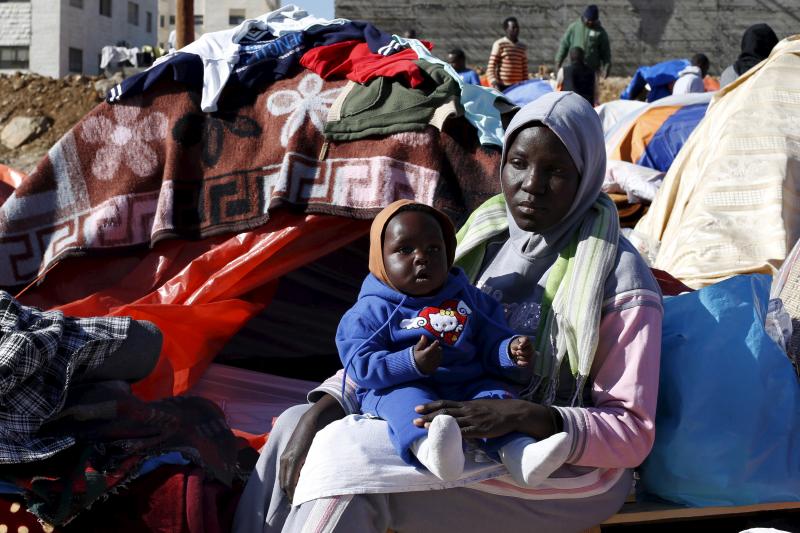PBS: Escaping Eritrea … [Read More...] about ካብ ውሽጢ ቤት ማእሰርታት ኤርትራ
Why Jordan Is Deporting Darfurian Refugees
Aaron Williams |
Early in the morning of December 16, Jordanian police rounded up around 950 Sudanese refugees living in Amman. Their hands were bound, and they were forced into buses, which shuttled them off to an empty military warehouse. For the past month, these Sudanese men, women, and children had been camping out in protest in front of the Jordan office of the United Nations High Commissioner for Refugees. At issue was the fact that, a year ago, the UNHCR had deprioritized their resettlement cases (in favor of processing Iraqi and Syrian refugee cases), and many of them had been evicted from their homes and were broke and sick.
That night at the warehouse, the detainees began chanting for their human rights, and Jordanian authorities, in coordination with Sudanese embassy officials, responded with beatings, tear gas, and live bullets. Detainees were wounded and injured, mothers and children became severely sick from the tear gas, and families were forcibly separated.

Authorities eventually took the severely sick and wounded to a local hospital near the airport. Once there, some managed to escape and return to Amman. Others were treated and taken back to the warehouse.
The next morning, the authorities put the refugees and asylum seekers back on the buses and dropped them off at Queen Alia Airport. They were going back to Sudan—back to the country led by Omar al-Bashir, which has been waging a war against its people in Darfur for the past two decades. As a recent Human Rights Watch report noted, the levels of violence and bloodshed in Darfur have reached highs not seen since 2004, when hundreds of thousands died.
“We are concerned about the fate of the Sudanese who were deported,” Adam Coogle, from the Jordan office of Human Rights Watch, told me. “We are actively trying to understand where exactly those who were deported have been taken to in Sudan. We know that these asylum seekers are very afraid of the central government in power in Khartoum and are worried about what may happen now that they have arrived to Khartoum.”
It was later confirmed by deportees who were still in contact with me that those who had been returned to Khartoum were quickly sent to a secret police detention facility in the city’s north and that others had been placed in a prison outside of the city.
Mohammed, sitting in a small room that acts as a house for his wife, children, brother, and another couple, managed to escaped with his entire family. But he also faces uncertainty about his life in Amman. “We had no money and so we were evicted from our last flat because we had not been able to pay rent for over three months,” he said. “Our landlord at this place is now threatening to sue us … but we still have no money.” Mohammed did not tell me explicitly why he left Sudan, but most of all the Sudanese families in Jordan were from Darfur. Many spoke of the violence that had driven them away: their villages had been burnt down, family members had been killed, and Sudanese military and militia members had threatened their lives. Most arrived in Amman with barely any money or belongings.
The treatment of women and children there was particularly harsh. One young mother recounted, “We were all in the warehouse and then the police started throwing tear gas. The tear gas made my children and me very sick so we were finally able to convince the police to allow me, my children, and my husband to go to a hospital. Once we were treated at the hospital, we ran away back to Amman.”
Many children and even some pregnant women now have health issues due to tear gas exposure. Two children we saw had bronchitis-like symptoms that doctors linked to the tear gas. One woman told us how the officers had bound her hands. “They even tied the hands of the mothers and the pregnant,” she said. “How is a mother supposed to care for her children if her hands are tied?”

A woman named Azzia spoke of how both she and her husband managed to escape, but upon returning to Amman continued to fear for their lives. She wonders if the Jordanians or Sudanese embassy officials will try to track them down or if her neighbors will report them to the police. She is too petrified to leave the house, even though she is eight months pregnant. Low on money and food, Azzia is now suffering from malnutrition and severe thyroid problems.
Another young woman, also a month away from giving birth, is in the same situation. “I’m too scared to leave the house to get treatment,” she said. “But even if I were to reach a hospital I don’t have the money to pay for medicine or vitamins I would need.”
BACK IN SUDAN
In Khartoum, the exact whereabouts of the deported are, for the most part, unknown. One Sudanese asylum seeker named Ali had once been placed in a secret police detention facility in Khartoum, where by some accounts at least some deported Sudanese are being held. Ali was put there because his relatives were affiliated with the Sudanese rebel movement, but he managed to escape the prison—though how he cannot say. He told me, “I was held there for a long time before I was able to escape and flee to Jordan. If you are being held at that place what happens next is never good. I fear for them. This is disgusting. I don’t think Jordanian officials realize what they have done. I don’t think they realize the blood that could be on their hands.”
One deportee that we were able to track down, Abdulmajid, told us that upon returning to Sudan, he had been arrested and then released, but only after Sudanese authorities confiscated all of his documents and forms of identification. Abdulmajid said that one officer told him his passport had been sent to the Sudanese Department of Security. Since then, Abdulmajid has managed to smuggle himself into a neighboring country, although he is still without papers.
THE SCARS
Of the 950 refugees, only 585 were deported, a UNHCR spokesperson told me. Hundreds had managed to escape, it seems, but the spokesman would not give details. I met and spoke to many of these escapees, who said that they had not been protesting at UNHCR that night, but came because relatives had been informed by police officers that they were to be resettled. “We have come to take you to the airport and you will be resettled to U.S.A., to Canada,” one refugee said he was told.
Those who escaped the detention facility in Jordan still bear the trauma and scars from that night. A number of families were forcibly separated during the deportation process. One man named Adam told me how the officers took his wife and six-month-old child from him. He and his child managed to escape, but his wife was sent back to Khartoum. He is legally unable to work, and during his entire two years in Amman had received only $100 from UNHCR. He is not sure how he will make a living when he still cannot work and is being sidelined by aid groups.
Many of those who were returned to Sudan are Darfuri and are considered enemies of the state. It is no wonder that many of these refugees’ first course of action, once returned and released, is to go on the run again. “My wife was deported to Khartoum,” a man named Mohanad said. “She’s been released by the authorities but they told her that she must come to one of the intelligence buildings once a week and check in with them. She is very afraid and is trying to find a way to flee Sudan.”
The International Refugee Assistance Project, a U.S.-based group that provides legal representation to refugees, Human Rights Watch, and multiple small charities that are in touch with deportees, confirmed that small groups of those who were released from prison have fled into neighboring Chad and Egypt. Betsy Fisher, deputy policy director and staff attorney for the International Refugees Assistance Project, explains how this simply turns them into refugees again. “Like the refugees still in Jordan, they are again living in desperate circumstances and in urgent need of monetary assistance as well as opportunities to be resettled,” she said. “They need the international community to take action.”
To many observers, the timing of the arrests and deportations seems suspicious. A source close to Sudanese security forces, who wishes to be unnamed, informed us that Sudan had coordinated the deportations with Jordan, and later, with Egypt too. Only a day after the December 16 deportations in Amman, a group of Darfuri asylum seekers were rounded up and kicked out of Egypt as well. The security official said that the Sudanese regime continues to urge Jordanian officials to return Darfurians to Khartoum to be prosecuted for their possible association to Darfurian rebel groups.
